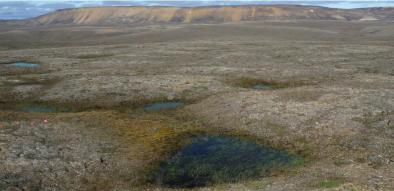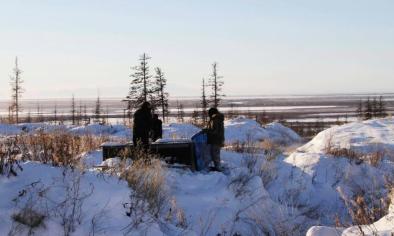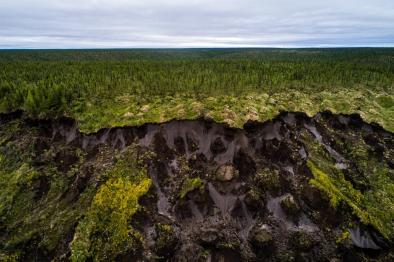Science Source
Resilience and vulnerability of permafrost to climate change
- States the resilience and vulnerability of permafrost to climate change depends on complex interactions among topography, water, soil, vegetation, and snow, which allow permafrost to persist at mean annual air temperatures (MAATs) as high as +2 °C and degrade at MAATs as low as –20 °C
- Compiles existing data to assess these interactions and tests the effects of varying conditions on mean annual surface temperatures (MASTs) and 2 m deep temperatures (MADTs) through modeling
- Finds that surface water had the largest effect, with water sediment temperatures being ~10 °C above MAAT
- Finds a 50% reduction in snow depth reduces MADT by 2 °C
- Finds that elevation changes between 200 and 800 m increases MAAT by up to 2.3 °C and snow depths by ~40%
- Finds that aspect caused only a ~1 °C difference in MAST
- Finds that covarying vegetation structure, organic matter thickness, soil moisture, and snow depth of terrestrial ecosystems, ranging from barren silt to white spruce (Picea glauca(Moench) Voss) forest to tussock shrub, affect MASTs by ~6 °C and MADTs by ~7 °C
- Finds that groundwater at 2–7 °C greatly affects lateral and internal permafrost thawing
- States that these analyses show that vegetation succession provides strong negative feedbacks that make permafrost resilient to even large increases in air temperatures
- States the analyses also show that surface water, which is affected by topography and ground ice, provides even stronger negative feedbacks that make permafrost vulnerable to thawing even under cold temperatures
Related Content
Headline

Jun 19, 2019 | Reuters
Scientists amazed as Canadian permafrost thaws 70 years early
Science Source
Permafrost is warming at a global scale
Boris K. Biskaborn, Sharon L. Smith, Jeannette Noetzli et al
Headline

Jan 17, 2019 | Washington Post via AP
World’s permafrost gets warmer; Siberia rises the most
Headline

Aug 21, 2018 | National Geographic
Exclusive: Some Arctic Ground No Longer Freezing—Even in Winter


